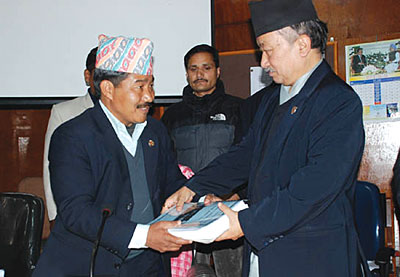 DINESH SHRESTHA |
The NC, UML and Madhesi parties, among others, have opposed the idea of 14 provinces with provision of special regions, protected regions and autonomous regions incorporating 23 ethnic communities within provinces. The 14 province model was passed in the Committee for State Restructuring with Maoist support, but some committee members feel the alternative six-state model that was discussed should also be taken to a full session of the CA.
"All proposals presented in the Committee should be tabled in a full session of the CA or else it will lead to conflict," said Sadbhawana leader Anil Jha at a meeting of the committee recently.
Responding to the idea of slotting Chitwan into the Madhes Pradesh, UML CA member Sita Kumari Poudel retorted, "We will see who dares to do that. If it is done there will be an agitation." MJF Vice President Jaya Prakash Gupta, on the other hand, warned that any attempt to separate Chitwan from the Madhes would be tantamount to waging war against the latter.
Neelam KC of CPN (ML) argued that finalising the issue in two hours was autocratic, as the committee had failed to decide even after 127 rounds of meetings and a four-day meeting of the sub-committee at Godavari Village Resort. Forty-two CA members commented on the draft at the final meeting of the committee, which doesn't augur well for agreement on federalism.
The 14-state proposal received 23 votes from Maoist and UML CA members. The majority also approved of political privileges to ethnic communities, special regions, protected areas and autonomous regions in the provinces. Fifteen members of the committee, however, demanded both proposals be presented at full CA sessions.
MJF registered a note of dissent and announced protest programs challenging the committee's decision. The NC, too, has registered a note of dissent demanding both the federal maps discussed be submitted to the CA. Even some Maoist committee members submitted notes of dissent.
To top it all, some ethnic organisations have not approved of the proposal for 14 ethnicity-based provinces. The Tharu Welfare Council has demanded a re-division of the provinces on the basis of population, geography and historical background. It has announced protest programs in Tharuhat-Tarai districts.
Clause 138(2) of the Interim Constitution says "a High Level Commission shall be constituted to recommend for the restructuring of the State" but the government failed to form the commission. Ex-president of the Nepal Bar Association (NBA) and lawyer Harihar Dahal says that state restructuring by ignoring the constitutional clause means that "As per law, this can be invalid". But another NBA ex-president and lawyer Shambhu Thapa says the commission would have only been an advisory body to the CA, and not forming it does not mean the CA can postpone writing the constitution.
Ultimately, even if only the 14-state model is discussed in a full session of the CA, it clearly is not the final draft. It not only requires approval in its entirety, every clause must be passed by a two-thirds majority. The State Restructuring Committee may feel it has fulfilled its mandate, but the road to federalism is a long one.
READ ALSO:
Constitution 2010, Nepali Times coverage of issues related to writing the new constitution


